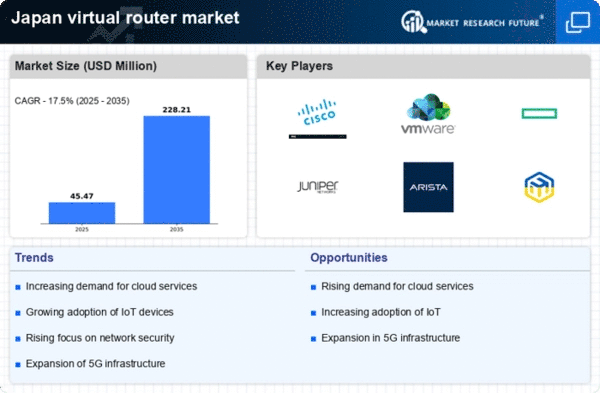Adoption of IoT Devices
The proliferation of Internet of Things (IoT) devices in Japan significantly influences the virtual router market. With millions of devices connected to the internet, the demand for effective data management and routing solutions has surged. In 2025, it is estimated that there are over 1 billion IoT devices in Japan, creating a complex network environment that requires sophisticated virtual routing technologies. The virtual router market is poised to capitalize on this growth, as organizations seek to implement solutions that can handle the increased data flow and ensure secure communication between devices. This trend indicates a shift towards more integrated and automated networking solutions.
Rising Cybersecurity Concerns
As cybersecurity threats continue to escalate, the virtual router market is experiencing heightened demand for secure networking solutions. In Japan, cyberattacks have increased by 30% in the past year, prompting organizations to prioritize security in their networking strategies. The virtual router market is likely to see growth as businesses seek to implement advanced security features within their routing solutions. This includes capabilities such as encryption, intrusion detection, and secure access controls. The focus on cybersecurity not only addresses immediate threats but also fosters trust among consumers and businesses, further driving the adoption of virtual routers in various sectors.
Increased Internet Penetration
The rise in internet penetration in Japan is a pivotal driver for the virtual router market. As of 2025, approximately 95% of the population has access to the internet, which fosters a growing demand for efficient networking solutions. This increased connectivity necessitates advanced routing technologies to manage the influx of data traffic. The virtual router market is likely to benefit from this trend, as businesses and consumers alike seek reliable and scalable solutions to optimize their internet usage. Furthermore, the shift towards remote work and digital services amplifies the need for robust virtual routing capabilities, enabling seamless communication and data transfer across various platforms.
Growing Demand for Network Virtualization
The trend towards network virtualization is gaining momentum in Japan, significantly impacting the virtual router market. Organizations are increasingly adopting virtualized networking solutions to enhance flexibility and reduce operational costs. By 2025, it is anticipated that over 60% of enterprises in Japan will implement some form of network virtualization. This shift allows for more efficient resource allocation and management, which is crucial in a rapidly evolving digital landscape. The virtual router market stands to benefit from this trend, as businesses seek solutions that can seamlessly integrate with their existing infrastructure while providing scalability and improved performance.
Government Initiatives for Digital Transformation
The Japanese government has launched various initiatives aimed at enhancing digital transformation across industries, which serves as a catalyst for the virtual router market. Programs promoting smart cities and digital infrastructure development are expected to drive investments in advanced networking technologies. By 2025, government spending on digital infrastructure is projected to reach ¥3 trillion, creating opportunities for the virtual router market to expand. These initiatives not only encourage the adoption of virtual routers but also emphasize the importance of secure and efficient data management systems, aligning with the broader goals of enhancing national competitiveness in the digital age.
















